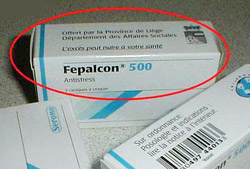The National Assembly constant committee on science, education, culture and youth affairs and the committee on ecology held parliamentary hearings yesterday to discuss the new drug bill of the NA. What’s today’s drug market like in Armenia? What are the issues and how can the new law solve them?
According to director of the experimental center for drugs and medical technologies Emil Gabrielyan, there is a lot of competition in the drug market of Armenia. Only 3-4% of drugs are sold in Armenia and there are nearly 20 importers, including large companies. Head of the Armenian Pharmaceutical Association Ghukas Ulikhanyan is also of the opinion that any businessman can easily import any drug. Is it possible that this market will turn into a monopoly or an oligopoly by some oligarchs?
“If they don’t destroy the market according to the law, I don’t think that there will be any monopoly,” said Gh. Ulikhanyan and added that there was a fear even back when a value added tax (VAT) was added on imported products, but it has already been a couple of years now that the market is free from such things. How can they “destroy the competitive field” with the law? There is one point in the bill, which states that it is only allowed to import drugs from the company or the representative.
“That can lead to a monopoly because any producer can make an agreement with the importer and only one company can import the drug. The arguments that we brought up were agreed on and I think that that part of the bill will be excluded,” says Gh. Ulikhanyan.
According to him, that point is not the only “flaw” in the bill, which may cause problems for businessmen and citizens. The bill also includes the pharmacy and drug kiosk variants.
“Based on the current law, both have the same functions. As for the new law, the small pharmacy has the right to sell drugs without a prescription. Small drug stores make up 80-90% of drug stores. In this case, they are going to be working with 300-400 brand name drugs and as a result, they will automatically close,” says Gh. Ulikhanyan. He believes that the prices will then rise and the needy will have a hard time getting medicine.
“I believe that the law has to make it clear what a pharmacy is and what apothecia is. That shouldn’t be left behind,” says head of the Armenian Pharmaceutical Association.
Specialists in this field are all of the opinion that since 2001, the value added tax has had a negative influence on drug imports. Prices go up, while drugs become less affordable.
Another issue concerns the drug registration system. According to Ulikhanyan, prices for drug registration are rather high in Armenia and the terms keep getting shorter. This last part doesn’t benefit the importer. Why not register the drug for 10 years, instead of 5?
“The thing is that the importer paying 2000 dollars will not be able to compensate the amount in five years, what’s more, he won’t get any profit,” says Ulikhanyan. He has his own solution for drug registration: import the drugs listed in Russia’s registered drugs.
“If the producer wants to sell a drug registered in Russia, he goes through the same paperwork as in Armenia, pays a little money to the state and registers the drug. Instead of the current 2000 dollars, he pays 600 or 1200,” says Gh. Ulikhanyan.
In his opinion, competition will rise, there will be more importers, prices will go down and more money will go to the state budget. In fact, based on Emil Gabrielyan’s statistics, there are 3,600 registered drugs in Armenia as of today, when that number is close to 18,000 in Russia.
“If we exclude some producers of the same drug, then it turns out that there are less registered drugs in Armenia,” says Gh. Ulikhanyan.
In addition, the registration process is too long not only in Armenia, but also worldwide because the World Health Organization believes that if it takes less than 2 months, then the laboratory experiments have been done with “eyes closed”.
Who is responsible for registering the “orphan drugs”-the drugs that are of vital significance? There is low demand, so the registration and import are unbeneficial. Gh. Ulikhanayn says that the current “Drug law” allows for “the government to register those drugs on the account of the state budget if it wants to”.
But these are not the only “orphan drugs” in Armenia. There are tons of expired drugs in Armenian hospitals (in fact, most of the drugs have remained from the humanitarian aid during the days of the earthquake) and their presence is already dangerous because they can be used for profit. According to deputy minister of health Tatul Hakobyan, there is one clause in the new law, which states how the accumulated drugs should be gotten rid of. That’s up to the Ministry of Ecology.
All the suggestions for the law will be considered by the corresponding National Assembly constant committees and will be discussed during the next four-day session.

